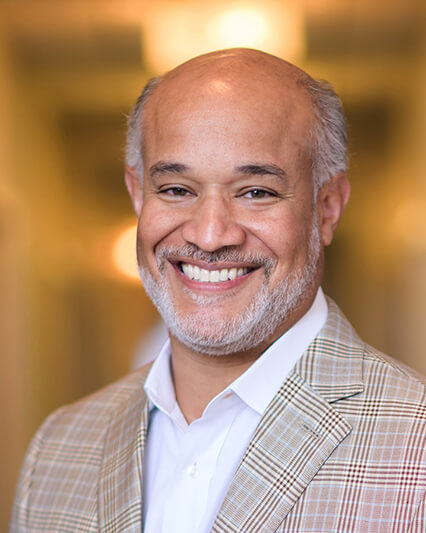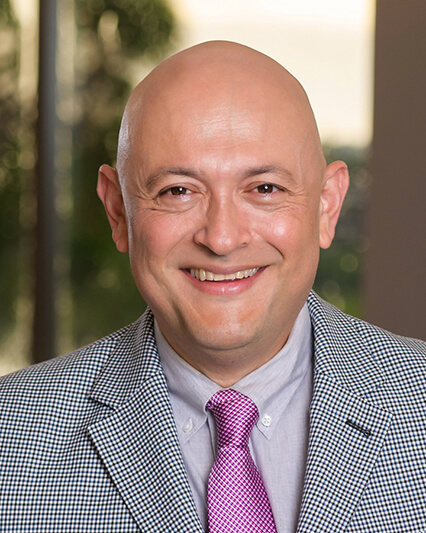
Brian Phillpotts, MD, is a board-certified ophthalmologist specializing in diseases and surgery of the vitreous and retina. “Expertise combined with humility” characterizes Dr. Phillpotts’ informative, straightforward and compassionate style of patient care. His area of concentration includes medical and surgical management of diabetic retinopathy, macular degeneration, retinal detachments, macular holes, epi-retinal membranes and other vitreo-retinal disorders such as retinal vascular occlusion and sickle cell retinopathy. Dr. Phillpotts is dedicated to educating patients about their conditions and treatment options, equipping them to make informed and confident decisions.

Alfonso Ponce, MD, specializes in medical and surgical treatment of diseases of the retina, including age related macular degeneration, retinal detachments, diabetic retinopathy, epi-retinal membranes, macular holes and other vitreo-retinal disorders from systemic conditions or trauma. Dr. Ponce is a board-certified ophthalmologist who grew up in Guatemala and graduated from Francisco Marroquin University in Guatemala where he obtained his Bachelor in Science and MD degree. His interest in retina started when he did his residency in ophthalmology at The New York Eye and Ear Infirmary where he was involved in retinal imaging studies and lutein measurement. He then continued his training by completing a fellowship in medical and surgical treatment of Retinal diseases at the Infirmary.

Brian Phillpotts, MD, is a board-certified ophthalmologist specializing in diseases and surgery of the vitreous and retina. “Expertise combined with humility” characterizes Dr. Phillpotts’ informative, straightforward and compassionate style of patient care. His area of concentration includes medical and surgical management of diabetic retinopathy, macular degeneration, retinal detachments, macular holes, epi-retinal membranes and other vitreo-retinal disorders such as retinal vascular occlusion and sickle cell retinopathy. Dr. Phillpotts is dedicated to educating patients about their conditions and treatment options, equipping them to make informed and confident decisions.

Alfonso Ponce, MD, specializes in medical and surgical treatment of diseases of the retina, including age related macular degeneration, retinal detachments, diabetic retinopathy, epi-retinal membranes, macular holes and other vitreo-retinal disorders from systemic conditions or trauma. Dr. Ponce is a board-certified ophthalmologist who grew up in Guatemala and graduated from Francisco Marroquin University in Guatemala where he obtained his Bachelor in Science and MD degree. His interest in retina started when he did his residency in ophthalmology at The New York Eye and Ear Infirmary where he was involved in retinal imaging studies and lutein measurement. He then continued his training by completing a fellowship in medical and surgical treatment of Retinal diseases at the Infirmary.
Since 1968, the Gills’ family has continued the legacy of an unsurpassed commitment to serving patients as if they were a member of their own family. Choosing St. Luke’s for your retinal care not only means choosing a premium multi-specialty practice committed to serving patient’s needs, but it also means choosing a practice that has devoted over 5 decades of service to shaping our legacy of life changing vision.
St. Luke’s Cataract & Laser Institute has built a sterling reputation for excellence in eye care, upheld by our dedicated team of eye surgeons and ophthalmologists. Renowned for their expertise and commitment to compassionate care, our professionals utilize state-of-the-art equipment and facilities. In keeping with our tradition of innovation, we’re at the forefront of developing new technologies and techniques in ophthalmology. From pioneering treatments to cutting-edge procedures such as retina injections, our commitment to advancing eye care mirrors the vision of our founder, Dr. James Gills, who opened our doors in 1968.
St. Luke’s is a trusted leader in the field, offering unparalleled expertise and proven results. Our retina doctors are experienced in treating a variety of retinal conditions.
Our team at St. Luke’s has strong community roots and is trusted for excellence in patient care. Our dedicated team of highly specialized ophthalmologists and retina surgeons is committed to providing personalized treatment plans that prioritize your vision and overall well-being.

Dr. Ponce 4.9 star rating

Dr. Phillpotts 4.8 star rating
The retina is a thin layer of tissue in the back of the eye that senses light and allows us to see. At St. Luke’s, Dr. Brian Phillpotts and Dr. Alfonso Ponce, along with the rest of our retina team, are experienced in treating vitreoretinal diseases, including diabetic retinopathy, macular degeneration, retinal detachment, and macular holes.


Macular degeneration (AMD) is an age-related condition of the macula. It is the most common cause of vision loss in the United States in those 50 or older, and its prevalence increases with age. AMD is caused by hardening of the arteries that nourish the retina. This deprives the sensitive retinal tissue of oxygen and nutrients that it needs to function and thrive. As a result, the central vision deteriorates. The macula is the center of the retina that controls sharp, straight-ahead vision; damage to the central retina leads to difficulty reading, seeing fine details, and recognizing faces.
Diabetes is a disease that occurs either when the pancreas does not secrete enough insulin—the hormone that regulates the level of sugar (glucose) in the blood— or the body cannot properly process it. Patients with diabetes are more likely to develop eye problems such as cataracts and glaucoma, but the disease’s effect on the retina is the main threat to vision. Most patients develop diabetic changes in the retina after approximately ten years of having the disease, and the effect of diabetes on the eye is called diabetic retinopathy.
Over time, diabetes can damage the blood vessels in the back of the eye, and this damage is known as diabetic retinopathy. The effect of diabetic retinopathy on vision dramatically varies depending on the stage of the disease.

“Dr. Phillpotts is a wonderful Eye doctor; he is the one that saved my eyesight! With out him I don’t know what happened to my eye? I’m very appreciate it and continue following up with him for eye care Will refer to family and friends who ever need help for eye surgery ones again Thank you so much for your help, Dr. Phillpotts, wishing you and your family all the best.”
“I would recommend Dr. Phillpotts to everyone! He is a wonderful doctor! He is friendly and takes time to explain everything in a way that is easy to understand! He never makes you feel like he must rush, rather he makes you feel that he has all the time in the world with you! He instills confidence in his knowledge and skills! When I am ready for surgery, I will not hesitate to have him be my surgeon!!!”
“Dr. Brian Phillpotts saved my life with a diagnosis of my high blood pressure!!After that, I receive three stents!”
“Dr Philpotts is exceptional. He is honest, caring and always available for questions. The best! Have always recommended him since my first visit with him back in 2005.”
“I have been in Florida 8 years. I have used St Luke’s since upon arriving. I find the care to be top notch. Dr. Ponce is wonderful and so is Dr. Hoffert. I would highly recommend both.”
“Not once have I had a bad experience with Doctor Ponce. On the contrary he has demonstrated to be a true professional. I am blessed to have been assigned to this wonderful caring doctor”
“Dr. Ponce is an amazing retina specialist. He listens to my concerns and is extremely thorough. He has a wonderful personality and an excellent bed-side-manner that always makes the visit less stressful. I feel that my eye health is in very good hands and extremely happy that my Optometrist recommended a Doctor With his expertise.”

